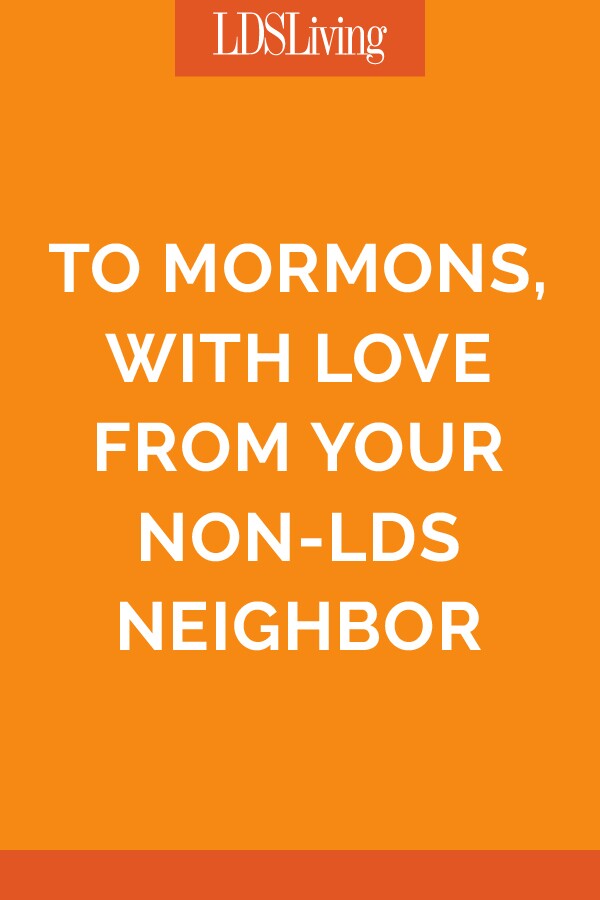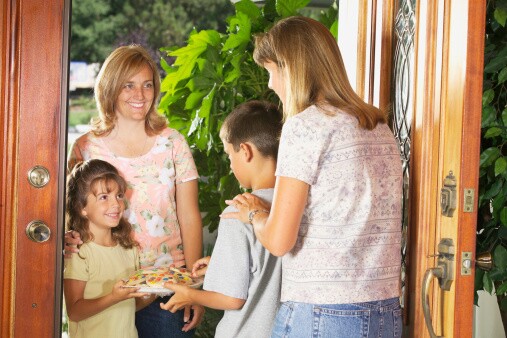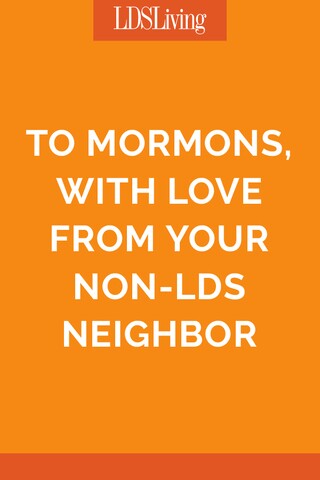
We didn’t intend to be the only nonmembers in our ward. We knew we’d be in the religious minority when we moved to our small town in Utah County, Utah, in 2002, but we expected that minority to be more than two-ish percent.
We’re mistaken for an LDS family everywhere we go because of where we live: a town I affectionately refer to as “Mayberry.” It doesn’t matter where we are—Utah, or any other state or country—if we cross paths with a person who knows the town where we currently live, the assumption is that all parties involved are members.
When we meet people in our own town for the first time, outside of our ward boundaries, they also assume we’re Brother and Sister Ross. We understand. And it doesn’t bother us . . . anymore.
When the time feels right, my husband or I reveal that we don’t happen to be members of the Church, followed by an enthusiastic and honest “ . . . although we love living in our community!” People are typically gracious but are also sincerely curious about our experience. Specifically, how did we end up in our town and what’s it really like for us?
Occasionally, our presence has caught people off guard and made them uncomfortable. Last fall, my husband, Chris, was in the front yard on a sunny Saturday afternoon, fiddling with landscape lights, digging in the dirt, and keeping an eye on our 5-year-old son. Our two older boys were running around the yard enjoying the pleasant weather. A car pulled into our driveway and a woman jumped out of the passenger side, approached Chris with a broad smile, and asked, “What’s the ward like here?”
My husband returned the smile and replied, “It’s great! We don’t happen to be LDS, but the neighborhood’s super nice.”
The woman said, “Oh,” turned around, got back into the car, and had a brief exchange with the man behind the wheel before they pulled out of the driveway, avoiding eye contact. Chris said, “I think I spooked her.”
People are almost always surprised to learn we’re not members, but they’re rarely “spooked.” I only share these examples to emphasize the Mormon-ness of our Mormon community.
Mormon Life as a Non-Mormon
Adapting to life in Mayberry seemed effortless at first—beautiful scenery, kind neighbors, and a quiet, predictable life rhythm. Although I knew we had moved to a predominantly LDS area—not only Utah, but Utah County, Utah—I remained naïvely hopeful that I would meet some other girls in my community and form a monthly wine-tasting group. As the weeks turned into months and months turned into years, I finally gave up all hope for this group ever developing in Mayberry.
Like any move to a new neighborhood, it takes a while to make friends. Most people are neighborly and invested in the safety and vibe of their chosen home, but the gift of a true friendship emerges slowly.
I can now say I have friends in Mayberry, including a couple of lifelong gems, but it took much longer than I anticipated to cultivate these relationships. In hindsight, it was my bad. Culture shock and paranoia hit me from left field and sabotaged many well-intended attempts from others at friendship.

The Conversion File
Having lived in religious melting pots throughout my life, I wasn’t prepared for what felt like an all-consuming church-based lifestyle. Social activities in Mayberry are church-driven, and combined with my understanding that members of the LDS Church are considered missionary members, I assumed every invitation extended to my husband, my children, or me was rooted in our “Conversion File.” Surely there was a file at the church that documented everything there was to know about our family, who made attempts to woo us to church, and the ratings their efforts earned. The non-member grapevine (and there is one) fueled my neurosis. Undoubtedly, a few people were sincere in their friendship attempts, but I believed everyone was trying to convert me. Everyone. All the time. Even the neighborhood kids.
I am a quiet, questioning, non-LDS Christian. I have read the Book of Mormon and sections of the Doctrine and Covenants. I am also an open-minded person, with what I perceive as an above-average level of tolerance and acceptance of others (I judge a little—after all, I’m human), and I have a broad and diverse group of individuals in my pocketbook of friends. It would be a very awkward dinner party if we all got together.
I know there is no file. But it took years before I felt safe and genuinely welcome as a non-seeking community member attending a ward-based social activity. Mixed messages, wrong information, different answers to the same questions, loneliness, paranoia, culture shock, and legitimately busy women created a vicious cycle in my mind. I was wrapped around the axle.
No Relief
I was periodically invited to Relief Society activities. Once I understood what Relief Society meant—a sorority for nice, married, sober girls—I asked an LDS friend who lived outside “our” ward boundaries if my attendance would send the wrong message. I was hungry for friendship but not interested in conversion. My friend told me if I ultimately was not interested in converting, the invitations would likely cease. “Relief Society activities are for LDS women, and I’m afraid if you don’t join the Church, they’ll probably stop including you.”
She wasn’t trying to convert me; I believe she was trying to answer my question honestly. Her answer discouraged me from attending Relief Society activities for the first few years, even though other women told me I was welcome regardless.
During the height of my paranoia, I was suspicious that any attempts to befriend me were rooted in Church obligations and not genuine friendship. One day a neighbor knocked on my door to invite me to a Relief Society function (again). This was a gal I thought I had things in common with outside of our faiths. I said, “If you’re inviting me because you think I’ll enjoy myself or you believe we have things in common as women, neighbors, wives, mothers, and hopefully friends, then I’m open. If I’m just a missionary opportunity, my feelings are hurt.”
My neighbor didn’t know what to say after my spiel. I’m sure I hurt her feelings—which was not my intention—but I was confused. I wanted to socialize with other women, but I wasn’t convinced that Relief Society invitations came with no strings attached. My new “friends” would surely liquor me up on lemonade, sugary baked goods, white rolls, and real butter. “Forget the crafts—brainwash Chrisy! Roll out the pool! Dunk her!”
I began to believe that the only way to be accepted and interact with other women was to become a Mormon. (So I did. And we all lived happily ever after. The end. . . . Kidding.)

Because of my personal revelation that I was different, I further tormented myself by wearing an uncomfortable Mormon filter. Even though my basic personality and mothering style were old fashioned and Chris and I went to bed earlier and were quieter than many of our neighbors, I felt compelled to portray a Sandra Dee meets Martha Stewart meets Earth Muffin image. When the doorbell rang in the evening and I had a glass of wine poured, internal sirens blared in my head. I was like a running back, shoving my kids out of the way so I could hide the glass in a cabinet, grab a piece of gum, and fluff my hair before answering the door.
I worried the neighbors wouldn’t let their kids come over to play if we had a coffee maker on the counter, beer in the refrigerator, or visible contraband of any kind. I was annoyed by the Mormon-ness of everyone, yet I desired to be liked. My efforts at a squeaky clean image were not completely disingenuous, because a part of me liked the idea. But that reality is a stretch for any person.
Trying to hide anything is exhausting. I felt tired, frustrated, and lonely. I wanted to “get it off me”—the feeling that I was in a place where I didn’t belong and that I couldn’t be me. The reality? Not one person shamed me for being me. These were my own self-imposed thoughts and restrictions.
Separation of Church and . . . Nothing
Once I fully understood and accepted that the Church was the hub of all social activities in Mayberry, I was able to loosen up and have fun at the soiree du jour. But it took a while. For instance, it was odd to me that almost all social events were church-driven, not neighborhood- or relationship-driven. As ward boundaries changed, so did relationships. It felt like an “It’s not you, it’s me” breakup. Women who initially befriended me drifted away when the boundary changed. My delusion was further fueled.
As much as I sometimes resented invitations to church activities, there were times within the first few years of our landing in Mayberry that I believed we were conspicuously excluded from events. I now know it was an innocent oversight—an LDS-specific event not appropriate for a nonmember—or a deliberate decision not to make us feel like the Church was smothering or trying to convert us. My husband had an experience with a man in our neighborhood who candidly said, “My wife and I struggle with when and how often to invite you guys to stuff. We don’t want you to feel like we’re going to sneak up behind you with a bucket of water and baptize you.”
I could sense the trepidation, and I felt slighted. I cried to my husband, “They don’t want us living here. They may not be throwing rocks at our house, but we’re not welcome.” Mormons couldn’t win. If they did invite us, I thought, You don’t reeeally want to be my friend; I’m just a missionary opportunity. If they didn’t, I told myself, We’re excluded again; it’s like The Amityville Horror and they’re hissing, “Get out.”
Everyone pretended like it didn’t matter if the answer was “yes” or “no” to the question “Are you LDS?” but the relevance was palpable, even if it was only a figment of my imagination.
I complained to my mother one day on the phone.
“I'm so lonely, Mom. I don’t know how much longer I can live here. I think I’m depressed.”
“Remember when your father and I lived in Venezuela? All I wanted was mustard on my sandwich. I couldn’t figure out how to say ‘mustard’ in Spanish. Even though I was in a beautiful place with interesting people, I was tired, lonely, and depressed. Know why? Culture shock, honey. You’re experiencing culture shock. I expected it in another country. You just didn’t see it coming.”
Mom was right. What at first seemed like interesting and understated differences in Mormon culture turned out to be just that: differences.
Moves are difficult. I’ve lived in six states; I’m familiar with move stress. Culture shock was new.
When in Rome
Time, patience, education, communication, and the willingness to make an effort all contributed to my finding acceptance as well as happiness in Mayberry. Culture shock ran its course while mutual trust and respect were earned. I came to realize that even though the Sesame Street song “One of These Things Is Not Like the Others” may have been true about one aspect of my existence in a small, Utah community, the rest of the things about all of us were human and very much “like the others.”
It was like a voice from above boomed, “Lighten up, Francis.” So I did. I began enjoying life, my neighbors, and some of the perks of my community.

Neighbor Gifts
It was Christmas 2002. The doorbell rang for at least the sixth time that evening. My parents were visiting from Arizona for our first Christmas in Utah.
“Is that another goodie?” asked Dad as I returned to the kitchen with an object in my hand.
“It’s an extension cord with a little rhyme on the note. They’re ‘extending’ their wishes for the merriest of Christmases to us. That is so creative.”
“An extension cord? Are you kidding me? I’ve never seen so much stuff. All those treats and odd items.” Dad motioned to the pantry shelf that was the placeholder for the neighbor gifts. “Do you know all these people?”
“Not really. But they’re so nice. My friend in Salt Lake City said when she first moved here, she wasn’t prepared for neighbor gifts either. She said now she has all of her gifts ready in a basket so she can pass them out when people come to her door. Kind of like Halloween. I had no idea how many people did this until a couple of days ago. It’s so fun!”
The doorbell rang again.
Dad said, “Quick. Run and get a jar of Vicks and put a bow on it.”
My Thank You Note
My mother used to tell me we only get mad at the people we love. "If I didn't care about you so much, I wouldn't bother to get angry or frustrated with you," she told me after a deserved scolding.
People, experiences, things, and places that affect us deeply often invoke mixed and powerful emotions. Life in Mayberry has contributed to feelings of loneliness, confusion, frustration, anger, and paranoia. But like yin and yang, there have also been overwhelming feelings of understanding, respect, friendship, safety, comfort, community, and gratitude.
Our children are being raised in Small Town, Utah County, Utah. My oldest son has very little memory of homes prior. My other two sons know only Mayberry.
Within the first six months of moving into our home, one of our sons was diagnosed with type 1 diabetes and hospitalized for a week. Less than a month later, I was rushed to the hospital via ambulance due to complications with a miscarriage. It was a devastating time. A neighbor who hardly knew us brought food, respected our privacy, and quietly and compassionately offered any assistance.
Women supported me when that third baby—the one I just had to have—arrived and didn't sleep for months. Frankly, the baby is here due in great part to the encouragement from friends: "Girl, you're in Utah. You can be pushing your grandbaby in a stroller and nursing your own baby all at the same time. You're not too old!" They surrounded me as I turned 40, which wasn't long after having that baby. They have listened to me air my frustrations about their culture, complimented my tattoos when we've gone swimming together, and made me feel comfortable attending Church-related functions—or not attending.
My community is beautiful. For a girl born in the Midwest, I can't imagine life without the mountains that surround us. Utah is home. It's not just the stunning landscape in all directions that makes this place so wonderful. It's the people. The gracious, forgiving—more accepting and tolerant than I gave them credit for—sincere people. Most of whom happen to be Mormon.
With love, I thank you.
The rest of this article appeared in our November/December 2011 issue.
Chrisy Ross is the author of To Mormons, With Love (A Little Something from the New Girl in Utah). To learn more about her, visit chrisyross.com.

